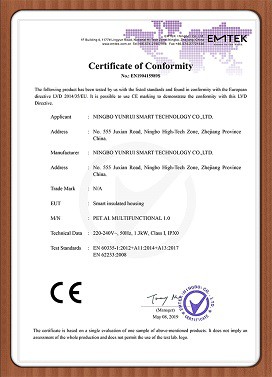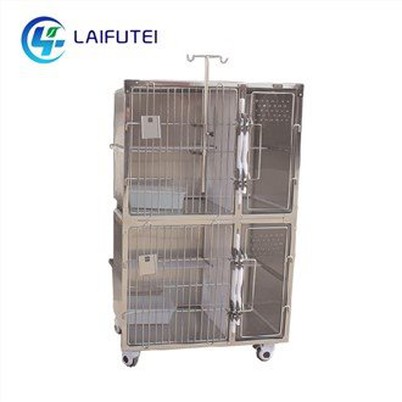
Stainless Steel Hospital Pet Cage
A stainless steel hospital pet cage, also known as a veterinary transport cage or a medical pet cage, is a specialized type of cage designed for use in hospitals, clinics, or any other medical facilities where pets require medical attention or observation. These cages are typically made from stainless steel, a material that is durable, corrosion-resistant, and easy to clean, making it ideal for medical environments.
Description
A stainless steel hospital pet cage, also known as a veterinary transport cage or a medical pet cage, is a specialized type of cage designed for use in hospitals, clinics, or any other medical facilities where pets require medical attention or observation. These cages are typically made from stainless steel, a material that is durable, corrosion-resistant, and easy to clean, making it ideal for medical environments.
Durability
Stainless steel is a highly durable material that can withstand the challenges often encountered in a hospital setting. It is resistant to corrosion, rust, and staining, making it ideal for long-term use. This durability ensures that the cages remain in good condition, reducing the need for frequent replacements.
Hygiene
Maintaining a clean and sanitary environment is crucial in a hospital, and stainless steel cages make this task much easier. The smooth surface of stainless steel is non-porous, which means it does not harbor bacteria, viruses, or other harmful pathogens. It can be easily cleaned and sanitized, reducing the risk of cross-contamination between pets.
Visibility
Transparent doors or panels on stainless steel cages allow for easy visibility of the pet inside. This is particularly important in a hospital setting, as it enables veterinary staff to monitor the condition of the pet without disturbing them. The visibility also helps to alleviate the anxiety of both the pet and their owners.
Security
Stainless steel cages are designed with secure locks and latches, providing a safe and secure enclosure for pets. This ensures that the pets remain contained and protected while they are in the hospital. The sturdy construction of stainless steel also prevents pets from damaging the cage or escaping.
Noise Reduction
The noise level in a hospital can be stressful for pets, potentially affecting their recovery. Stainless steel cages are well-known for their noise isolation properties, reducing the transmission of sounds from the surrounding environment. This creates a calmer and more relaxing atmosphere for the pets, aiding in their healing process.
Customization Options
Stainless steel hospital pet cages can be customized to accommodate specific needs and preferences. They come in various sizes and configurations, allowing for efficient use of space in the hospital. Additionally, accessories such as removable trays, adjustable shelves, and ventilation systems can be added for enhanced comfort and convenience.
Why Choose Us
Competitive Prices
We offer our products at competitive prices, making them affordable for our customers. We believe that high-quality products should not come at a premium, and we strive to make our products accessible to all.
Efficient And Convenient
The company has established marketing networks around the world to provide high-quality services to customers in an efficient and convenient manner.
Advanced equipment
We take great measures to ensure that we work with the industry's highest quality equipment and that our equipment is regularly and meticulously maintained.
High quality products
We always put customer needs and expectations in the first place, refine on, continuous improvement, to seek every opportunity to do better, to provide customers with their expectations of quality products, to provide customers with the most satisfactory service at anytime.
Rich Experience
Has a long-standing reputation in the industry, which makes it stand out from its competitors. With over many years of experience, they have developed the skills necessary to meet their clients' needs.
Professional team
We have a team of skilled and experienced professionals who are well-versed in the latest technology and industry standards. Our team is dedicated to ensuring that our customers get the best service and support possible.
Standard Cage
This is the most basic type of stainless steel hospital pet cage. It typically consists of a rectangular or square-shaped enclosure with a solid stainless steel frame and walls. The cage may have a single door or multiple doors for easy access to the animal. Standard cages are available in various sizes to accommodate different types and sizes of pets.
Recovery Cage
Recovery cages are designed for post-operative or recovering animals. They often have additional features such as a removable top or side panels for easy access to the animal, as well as a padded or cushioned floor for comfort. Recovery cages may also have adjustable shelves or platforms to provide a comfortable resting area for the animal.
Oxygen Cage
Oxygen cages are specifically designed for animals that require supplemental oxygen therapy. These cages have built-in oxygen delivery systems, such as ports or tubing, to provide a constant flow of oxygen to the animal. Oxygen cages may also have clear panels or doors for easy monitoring of the animal's condition.
Isolation Cage
Isolation cages are used to separate and contain animals that have contagious or infectious diseases. These cages are designed with additional features to prevent the spread of disease, such as sealed walls, separate ventilation systems, and easy-to-clean surfaces. Isolation cages may also have a separate entrance or anteroom for veterinary staff to change protective clothing before entering the cage area.
Specialty Cage
Specialty cages are designed for specific purposes or medical conditions. For example, there are cages designed for animals with mobility issues, such as those with wheels or ramps for easy access. There are also cages designed for animals with behavioral issues, such as those with reinforced walls or additional security features.
The material of a pet stainless steel hospital cage is primarily stainless steel, which is an alloy composed primarily of iron and chromium. The chromium content typically ranges between 10.5% and 18%, and it is this element that provides the corrosion resistance and the shiny finish associated with stainless steel. The presence of chromium allows for the formation of a passive layer of chromium oxide on the steel's surface, which protects the underlying metal from oxidation and rust.Stainless steel comes in several grades, each with different properties suited for various applications. For hospital pet cages, the most common grade used is Grade 304, also known as AISI 304 or 18/8 stainless steel, because it offers a good balance between formability, weldability, strength, and corrosion resistance. Grade 304 contains both chromium and nickel, which further enhance its durability and resistance to rust.

Application of Stainless Steel Hospital Pet Cage
Post-Surgery Recovery
Stainless steel hospital pet cages are commonly used for post-surgery recovery of animals. These cages provide a safe and secure environment for animals to rest and heal after surgical procedures. The stainless steel construction ensures durability and easy cleaning, which is essential for maintaining a sterile and hygienic recovery area.
Containment and Restraint
Stainless steel hospital pet cages are used to safely contain and restrain animals during examinations, treatments, or procedures. The sturdy construction of these cages prevents animals from escaping or causing harm to themselves or veterinary staff. They provide a controlled environment for handling and working with animals, ensuring the safety of both the animal and the veterinary professionals.
Isolation of Infectious Animals
Stainless steel hospital pet cages are crucial for isolating animals with contagious or infectious diseases. These cages have sealed walls and separate ventilation systems to prevent the spread of pathogens. Isolation cages help protect other animals in the facility from potential infections and allow for proper treatment and monitoring of the isolated animal.
Oxygen Therapy
Some stainless steel hospital pet cages are designed with built-in oxygen delivery systems. These cages are used for animals that require supplemental oxygen therapy, such as those with respiratory conditions or recovering from anesthesia. The cages provide a controlled oxygen-rich environment, ensuring the animal receives the necessary oxygen levels for proper healing and recovery.
Behavioral Management
Stainless steel hospital pet cages can also be used for behavioral management of animals. For example, cages with reinforced walls or additional security features are used for animals with aggressive or anxious behaviors. These cages provide a safe and secure space for animals that may pose a risk to themselves or others, allowing veterinary staff to work with them safely.
Temporary Housing
Stainless steel hospital pet cages are often used for temporary housing of animals in veterinary clinics or animal hospitals. They provide a clean and comfortable space for animals awaiting procedures, examinations, or adoption. The stainless steel material is easy to clean and sanitize, ensuring a hygienic environment for the animals.

Process of Stainless Steel Hospital Pet Cage
Design and Planning
The process begins with the design and planning phase. Our skilled engineers work closely with veterinarians and pet care experts to understand the specific needs and requirements of hospital pet cages. They consider factors such as cage size, ventilation, accessibility, and durability. Using advanced computer-aided design (CAD) software, a detailed 3D model is created, allowing for visualization and adjustments if needed.
Material Selection
Stainless steel is the primary material used in manufacturing hospital pet cages due to its excellent properties. It is corrosion-resistant, easy to clean, and highly durable. The selected stainless steel grade must comply with industry standards to ensure the highest quality and longevity of the cages.
Metal Fabrication
The metal fabrication process involves cutting, bending, welding, and assembling stainless steel sheets and rods. Automated cutting machines are used to achieve precise dimensions, ensuring consistency in the final product. Skilled welders join the various components together, creating a sturdy and reliable structure. Attention to detail is crucial in this stage to ensure that all joints are securely welded, minimizing any risks of potential hazards.
Surface Treatment
After fabrication, the cages undergo surface treatment to enhance their appearance and durability. This involves a multi-step process, starting with degreasing and cleaning to remove any impurities. Next, the cages are thoroughly rinsed and dried. A special chemical treatment is applied to promote adhesion, followed by a coating of high-quality paint or powder coating. This final step not only enhances the visual appeal of the cages but also provides an extra layer of protection against corrosion and scratches.
Quality Control
Quality control is of utmost importance in the manufacturing process of stainless steel hospital pet cages. Each cage undergoes a series of rigorous tests and inspections to ensure compliance with industry standards. Our quality control team examines the structure, dimensions, welding integrity, and surface finish to guarantee that every cage meets or exceeds customer expectations.
Packaging and Delivery
Once the cages pass the quality control procedures, they are carefully packaged to prevent any damage during transportation. Each cage is wrapped and cushioned to ensure safe delivery to the veterinary hospitals or clinics. The cages are then delivered to the designated locations, where they are ready to be installed and serve pets in need of medical care.

Components of Stainless Steel Hospital Pet Cage
The main structure of the cage, usually made of stainless steel tubes, which form the shape and size of the cage. The bottom part of the cage, usually made of stainless steel plate, which provides a flat and stable surface for pets to stand on. The access door of the cage, usually made of stainless steel plate or wire mesh, which can be opened and closed to allow pets to enter and exit. A removable tray at the bottom of the cage, usually made of plastic or stainless steel, which is used to collect pet feces and urine. A device for feeding and drinking, usually attached to the cage, which is used to provide pets with food and water. A device for carrying the cage, usually attached to the top or side of the cage, which is used to move the cage easily. A device for locking the cage door, usually attached to the door, which is used to prevent pets from escaping. A label for identifying the cage and pet, usually attached to the outside of the cage, which is used to record the pet's name, species, gender and other information.
Maintenance Stainless Steel Hospital Pet Cage
Regular cleaning of the pet cage is very important to keep it clean and hygienic. Use a mild detergent and warm water to clean the cage, and pay attention to cleaning the corners and crevices to remove dirt and bacteria.After cleaning, the pet cage needs to be disinfected to kill bacteria and viruses. You can use a disinfectant spray or wipe the cage with a disinfectant solution. Regularly check the components of the pet cage, such as locks, hinges, and grids, to ensure that they are in good working condition. If any components are damaged or worn, they need to be replaced in time.Stainless steel pet cages need to be kept dry to avoid moisture and rust. If the cage is wet, wipe it dry with a towel in time. Regularly check the pet cage to ensure that it is in good condition and safe for pets. If you find any problems, you need to deal with them in time.
What Is the Size of the Pet Stainless Steel Hospital Pet Cage
The Pet Stainless Steel Hospital Pet Cage comes in a range of different sizes to accommodate pets of various sizes. One commonly available size for this cage is 30 inches in length, 18 inches in width, and 20 inches in height. This size is suitable for small to medium-sized pets such as cats, small dogs, and rabbits.The cage is made of high-quality stainless steel, which ensures durability and longevity. The stainless steel construction also makes it easy to clean and maintain, ensuring a hygienic environment for your pet.This particular size of the Pet Stainless Steel Hospital Pet Cage features a solid base with a removable tray for easy cleaning. The cage is equipped with a hinged door that provides easy access to your pet while maintaining its safety. The door is securely lockable to prevent any accidental escapes or unauthorized access.
With proper ventilation and ample visibility, the cage allows your pet to feel comfortable and secure during their stay at the hospital or during transportation. The stainless steel material is resistant to rust and corrosion, making this cage suitable for both indoor and outdoor use.It is recommended to measure your pet's size before selecting the appropriate size cage to ensure a comfortable fit. Additionally, it is important to consider the length of stay or transportation duration to choose a size that allows your pet to move around comfortably.
The Pet Stainless Steel Hospital Pet Cage is available in various sizes, with a common size of 30 inches in length, 18 inches in width, and 20 inches in height. This cage provides a durable and hygienic environment for small to medium-sized pets. Its stainless steel construction ensures longevity and easy maintenance. Consider your pet's size and the duration of stay or transportation when selecting the appropriate size of this cage.
Can the Stainless Steel Hospital Pet Cages Be Customized to Fit Specific Requirements
Size and Dimensions
The cage can be manufactured to precise measurements to accommodate different breeds of animals, from small pets like rabbits and guinea pigs to large dogs. The length, width, height, and door size can all be adjusted according to the client's specifications.
Design Features
Customization may include special door designs, such as double doors for easier access, sliding doors for compact storage, or rounded corners for safety. Additionally, windows or observation panels can be added for better visibility and interaction with the pet.
Material Thickness and Grade
The thickness of the stainless steel tubing and sheet metal can be varied to increase the structural integrity and security of the cage. High-grade stainless steel, such as Grade 316, can be used for enhanced corrosion resistance in environments where this is a concern.
Accessories and Options
A variety of accessories can be integrated into the cage design, including feeding bowls, water dispensers, perches, nesting areas, and removable trays for easy cleaning. Additional features like lock mechanisms, handles, wheels, or racks for identification tags can also be included.
Safety Compliance
The cages can be designed to comply with relevant safety standards and regulations, ensuring that the customized solution meets the necessary health and welfare requirements for pets.
Finishes and Color
While stainless steel typically comes in a silver finish, certain treatments can alter its appearance. For instance, powder coating can be applied to add color or a different texture to the exterior of the cage.
Are There Any Safety Precautions When Using Pet Stainless Steel Hospital Pet Cages
Proper Ventilation
Adequate ventilation is essential to maintain a healthy environment inside the stainless steel pet cages. Ensure that the cages have proper ventilation systems or openings to allow for fresh air circulation. This helps prevent the buildup of odors, humidity, and potentially harmful gases.
Secure Doors and Latches
Always ensure that the doors and latches of the stainless steel pet cages are securely closed and locked. This prevents animals from escaping or accidentally opening the cage doors. Regularly inspect the doors and latches for any signs of wear or damage and promptly repair or replace them as needed.
Smooth and Rounded Edges
Check the cage for any sharp or rough edges that could potentially harm the animals. Smooth and round any sharp edges or corners to prevent injuries or scratches. Regularly inspect the cages for any signs of damage or wear that could create sharp edges and address them promptly.
Proper Size and Comfort
Ensure that the stainless steel pet cages are appropriately sized for the animals they will house. The cages should provide enough space for the animals to move comfortably, lie down, and stretch. Avoid overcrowding the cages, as this can cause stress and discomfort for the animals.
Regular Cleaning and Sanitization
Maintain a regular cleaning and sanitization schedule for the stainless steel pet cages. Clean the cages thoroughly between uses to remove any dirt, debris, or potential pathogens. Use appropriate cleaning agents and disinfectants recommended for veterinary use to ensure a hygienic environment.
Monitoring and Observation
Regularly monitor the animals housed in the stainless steel pet cages. Observe their behavior, eating habits, and overall well-being. Promptly address any signs of distress, illness, or injury. Provide appropriate bedding, toys, or enrichment items to keep the animals mentally stimulated and comfortable.
Staff Training
Ensure that all veterinary staff members are properly trained in the safe and appropriate use of stainless steel pet cages. Provide training on handling animals, securing the cages, and recognizing signs of stress or discomfort in the animals. Regularly update staff training to stay informed about best practices and safety guidelines.
Our Factory
Ningbo Light Medical Technology Co., Ltd. Is a collection of research and development, production and sales for the integration of high and new tech enterprise. Proceeding from clinical requirements in veterinary medical industry, it is committed to developing exclusive devices in the field of intelligent veterinary medical care. Wu Yufu, as the founder of the company, is the national registered veterinarian with nearly 20 years of animal clinical experience.

Certifications






FAQ
Q: Are pet stainless steel hospital pet cages expensive?
Q: Can pet stainless steel hospital pet cages be expanded or added to?
Q: Are there any safety precautions when using pet stainless steel hospital pet cages?
Q: Can pet stainless steel hospital pet cages be used for different types of pets?
Q: Are there any warranties or guarantees for pet stainless steel hospital pet cages?
Q: Can I buy stainless steel hospital pet cages for pets online?
Q: Are there any environmental benefits of using stainless steel hospital pet cages for pets?
Q: Can pet stainless steel hospital pet cages be personalized or customized?
Q: Are there maintenance requirements for pet stainless steel hospital pet cages?
Q: Are there any additional features or accessories that can enhance the functionality of a pet stainless steel hospital pet cage?
Q: Why is stainless steel used to make hospital pet cages?
Q: What are the advantages of a Pet Stainless Steel Hospital Pet Cage?
Q: How big is a Pet Stainless Steel Hospital Pet Cage?
Q: Is a Pet Stainless Steel Hospital Pet Cage suitable for all pets?
Q: Can a Pet Stainless Steel Hospital Pet Cage be customized?
Q: Are there any special designs or features in a Pet Stainless Steel Hospital Pet Cage?
Q: How is a Pet Stainless Steel Hospital Pet Cage cleaned and sanitized?
Q: Can a Pet Stainless Steel Hospital Pet Cage be used at home?
Q: Are Pet Stainless Steel Hospital Pet Cages heavy?
Q: Can pet stainless steel hospital pet cages be used outdoors?
Hot Tags: stainless steel hospital pet cage, China stainless steel hospital pet cage manufacturers, suppliers, factory, xl wire dog crate, digital radiology veterinary, low vet dental cleaning, vet recommended dog dental care, veterinary medical imaging, prairie dog cage
Send Inquiry
You Might Also Like
















